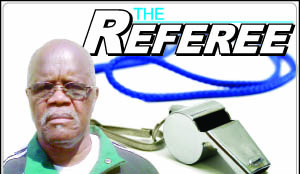IN the immediate three past series I have dealt with Parts 1, 2 and 3 of Law 12. As a recap, Parts 1, 2 and 3 covered the Direct Free-Kick Offences, Indirect Free-Kick Offences and Cautionable Offences respectively. Today’s episode is Part 4 and marks the end of Law 12 series.
This particular episode is dealing with more grave offences which attract in addition to awarding a free-kick a subsequent sanction which is expulsion of a guilty player. The theme of today’s episode is therefore “Sending-Off Offences.”
If while the ball is in play, a player, substitute or substituted player throws an object including a match ball or boot at an opponent or other person using excessive force, the Referee stops play, send-off and shall a Red Card the player, substitute or substituted player guilty of violent conduct.
Who may be sent-off and shown a Red Card? Only a player, substitute or substituted player may be sent-off and shown a Red Card. All players, substitute and substituted players come under the jurisdiction of the Referee whether they are on the field of play or not.
Once a player is sent-off and shown a Red Card, he must leave the vicinity of the field of play and the technical area.
A team official cannot be shown a Red Card. However, if a team official is guilty of irresponsible behaviour, the Referee will expel him from the technical-area and its vicinity behind the boundary fences where such a fence exists.
The team official includes all persons allowed in the technical-area (Medics, Manager, and the Coach, etc) other than the players, substitutes and substituted players.
Last week a reader texted me and requested me to elaborate on the Back Pass Rule. My response is that: “A player is Cautioned and shown a Yellow Card if he uses a deliberate trick while the ball is in play to pass the ball to his own goal-keeper with his head, chest, knee, etc in order to circumvent the Law, irrespective of whether the goal-keeper touches the ball with his hands or not.
The offence is committed by the player in attempting to circumvent both the Letter and Spirit of Law 12.
Therefore, a player is Cautioned and shown a Yellow Card not for the Act of passing the ball back to his goal-keeper per see but for the Act of Unsporting Behaviour of attempting to circumvent the Law.
Sending-Off Offences:
A player, substitute or substituted player is sent-off if he committees any of the following seven offences:-
• Serious Foul Play
• Violent Conduct
• Spitting at an opponent or any other person
• Denying the opposing team a goal or an obvious goal-scoring opportunity by deliberately handling the ball (this does not apply to a goal-keeper within his own penalty-area).
• Denying an obvious goal-scoring opportunity to an opponent moving towards the player’s goal by an offence punishable by a free-kick or a penalty-kick.
• Using offensive, insulting or abusive language and/or gestures.
• Receiving a second caution in the same match.
A player, substitute or substituted player who has been sent-off must leave the vicinity of the field of play and the technical area.
Serious Foul Play:
A player is guilty of serious foul play if he uses excessive force or brutality against an opponent when challenging for the ball when it is in play.
A tackle that endangers the safety of an opponent must be sanctioned as serious foul play.
Any player who lunges at an opponent in challenging for the ball from the front, from the side or from behind using one or both legs, with excessive force and endangering the safety of an opponent is guilty of serious foul play.
Advantage should not be applied in situations involving serious foul play unless there is a clear subsequent opportunity to score a goal.
A player guilty of serious foul play should be sent-off and play is restarted with a direct free-kick from the position where the offence occurred or a penalty-kick if the offence occurred inside the offender’s penalty-area.
Violent Conduct:
A player is also guilty of violent conduct if he uses excessive force or brutality against an opponent when not challenging for the ball.
He is also guilty of violent conduct if he uses excessive force or brutality against a team-mate, spectator, team official, match official or any other person.
Violent conduct may occur either on the field of play or outside its boundaries, whether the ball is in play or not.
Advantage should not be applied in situations of involving violent conduct unless there is a clear subsequent opportunity to score a goal. The referee must send-off the player guilty of violent conduct when the ball is next out of play.
A player, substitute or substituted player who is guilty of violent conduct must be sent-off.
Chileshe_mukuka@yahoo.co.uk; Phone 0966/0978 759558 or 0955 959558.







